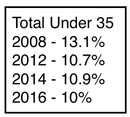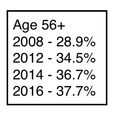 Earlier this week one of our children's workers took some time to share about how much he enjoyed our oldest, and what a blessing he was to work around. It was incredibly humbling because sometimes we feel like as parents good things happen by accident. I took some time too to thank him for all his work, and his commitment each week to investing in kids, not just mine, but the entire church's. The way many churches are designed, next generation ministries have separate facilities largely removed from the main traffic flow of the congregation (think "Youth Building" or "Children's Wing"), so the work done in those areas, though eternally important, often goes unseen by the bulk of the body. The reality is, it's hard to be a parent. It's hard when you're tired, when the demands of the day catch up to you, when it feels like you're playing hot potato with sickness, and when you turn on the evening news. Likewise, it's hard to be a next generation volunteer in a church. You only get a limited amount of time each week, you often wonder if what you're doing is getting through, and you worry about what happens when they go home. I know a lot of children's and youth workers who miss worship services, don't get adequate help, find themselves struggling for resources, and more. Though they're committed to the work and to their ministry, it can weigh down after a while. This is one of the things I have as a regret from my time as a student pastor, I wasn't as much an encourager for parents as I should have been. I didn't take the time to share as much as I should have. Whatever the reason was, whether I convinced myself they didn't really care, treated it like a glorified babysitting service, or that it didn't matter... I blew it. Saying you're a champion for parents and families is one thing, making the effort to invest is another. So here's what I want you to do this week. I want you if you're a parent to take some time and encourage the volunteers, directors, and helpers in your church's next generation ministries. Be sure to thank them for what they're doing. And tell them what your child or student is learning and sharing with you. Ask for ways to help them, to come alongside them, to resource them, and to connect them to others in the church. And if you're a next generation volunteer, director, or leader, take some time to give a note of encouragement to the parents of the kids and students in your ministry. Give them a glimpse into what's going on, and make a commitment to pray for them. Remember, your job isn't to exclusively focus on the children or students. It's a mistake we can far too easily fall into (trust me, I did it) to assume that parents are disengaged or don't care. There will be those who never read your newsletter, pay attention to your ministry, or make it a priority for their kids & students to come. But for the most part, those parents want to be involved and want to play a role in shaping their kids' faith. They need you to help connect it, and encourage them in it. Connecting church and home begins with the intersection of parents and volunteers. When they're communicating, when they're working together, and when they're sharing the same convictions, it leads to a multiple generation impact.
0 Comments
Back in 2013 I defended and finished my doctoral thesis, where I looked at the leadership development of Millennial ministry staff members as they were discipled by their lead pastor. It was as thrilling as you might expect. And at the end of it all, I wrote a Seinfeld episode "It was a dissertation about nothing!" Unfortunately because of my methodology, I was only able to use a small number of churches, which led to insignificant conclusions. It's available online as a PDF if you need help sleeping at night. One of the best tools I discovered during the process was the Compensation Study put together jointly by LifeWay and Guidestone, giving one of the most comprehensive snapshots of ministry demographics in the Southern Baptist Convention. It will give you a breakdown by education, church size, state, full-time or part-time, by staff position, and age. Churches can use it to determine compensation packages based on similar situations, and researchers can get a glimpse at the overall profile of SBC ministry leaders. In 2016, 4,558 pastors alone participated. Needless to say, it's an incredible wealth of data. Below you'll see a table that breaks down the ages of full & part-time pastors for 2008, 2012, 2014, and 2016. I wish I could include 2010, but I haven't been able to get that raw data. If you've got it, I'd love it!  Right off the bat, we have to acknowledge this isn't a perfect sampling. It is only of those who actively participated in the study. But because there's so many, it's a good picture of SBC pastors. The point of this essay is to highlight some trends that I observed, and some connection to my doctoral thesis, which bears implication today on raising up leaders on your church staff. The first thing that's easy to observe from this is that overwhelmingly, churches are continuing to give lead pastor positions to older men. There's nothing wrong with that. I'm more prepared at 34 to be a pastor than I was at 24. Even at 30. By valuing the position of pastor and reserving it for those who have proven themselves, it's natural that it's typically filled by men with some life experience behind them. But one thing I noticed along with that is that lead pastor positions aren't getting any younger. Check out this table, which I compiled the decline in percentage of younger pastors. If anything, lead pastor positions are being filled by an increase of older men. This isn't a negative, just an observation.  But along with that comes the observation that the percentage of older pastors in SBC churches has in fact increased since 2008. One of the key foundations for my dissertation was that as the Baby Boomer generation moved into retirement, there would be a need to look to Millennials to fill those roles, since the generation between them (Gen-X) was a much lower population base. It's hard to prove this, but my inference is that pastors are staying in ministry longer and not retiring as quickly, and there are ample numbers of older Gen-X who are able to move into these lead pastor roles. Because the oldest Millennials are only now entering their mid 30's, it's not a far conclusion to suggest that older colleagues are still preferred for lead pastor positions. So what does all this mean? It means simply that the importance of intergenerational discipleship is still there, especially with younger men on the ministry staff. Another project I did for a paper I presented at SPCE in 2014 dealt with career expectations among SBC staff members. The gist of that work was that while many staff members are content with their roles and don't have a desire for a lead pastor position, many do. And they are in a unique position with their relationship with their lead pastor to be discipled towards that lead pastor role. The wisdom, experience, and tenure of the current lead pastor is invaluable to the staff member who desires to one day become a lead pastor. Intergenerational discipleship is relational, informal, and intentional. It's relational in the sense that the lead pastor needs to know their staff, and vice versa. Effective ministry happens through the deepening of relationships. And sadly one of the inferences I made from my thesis was that "these guys spend 40 hours a week working together and it looks like they don't know each other!" So older pastor, take time to invest in younger guys on your staff. Invest especially in those who have a desire to one day occupy a lead pastor role. Give them more than your leftovers. Give them your time, give them your platform on occasion, and give them opportunity. Listen to them. I'll never forget the heartache of being told I didn't have an opinion because "I didn't have the experience" from my pastor. Lead pastors, listen to those guys on your staff, and develop a relationship with them. Don't be intimidated by them. They don't want your job. They want to learn from you. They're loyal to you. And they've taken hits for you. Give them the same in return. It's also informal. Discipleship doesn't happen in a course, curriculum, or program. And even when you work through a reading list (which you should), or develop case studies (which you should), or work on objective-based learning (which you should), the meat of discipleship happens informally. It happens during conversation. It happens more when it's caught than when it's taught. When Jesus talked about this, He said the student wasn't complete until he was like his teacher. That's more than graduation, that's imitation. Intergenerational discipleship means you're letting your life, experiences, and mistakes serve as a transparent lesson for the reality of ministry. Finally, it's intentional. No discipleship, no growth, no development, happens by itself. In fact, the #1 answer I've gotten over several surveys of staff members on what their lead pastors were doing to help develop them as leaders was "Nothing." If you want to develop yourself as a leader, you've got to take initiative and be intentional about it. You've got to ask questions, make yourself available, make every effort to secure your leader's time, and learn as much as you can. Likewise, lead pastors need to be proactive in their scheduling so that their time is well-spent, and they are able to devote the time necessary to those on their staff with a desire for a lead pastor role. The reality is those churches are typically 400-500 people, and pastors live in the tension of shepherding a small church while managing a large church. Confused? Me too. But that's why it's so important to be intentional. If you're not, you'll find yourself on Friday saying "maybe next week?"  Thanks for letting me nerd out on this! If you get a chance, check out the book I wrote on developing a ministry team. It's full of practical information and steps for your church to have not just a staff, but a healthy and effective team.  Last night I came across an article by Jason Allen, president of Midwestern Seminary, on the importance of an orderly home for ministry leadership. I loved the candor, wisdom, and honesty he brings to the table about the connection between a ministry leader's home life and their impact on the local church. One thing he quoted jumped out at me, and I'm so thankful this mindset has been changed. “A man has to choose. He can have either a great family or a great ministry. He cannot have both.” I don't know who said it, and it doesn't really matter. As Allen points out, this is unhealthy, unsustainable, and wrong. Sadly when we look at the family lives of many of our "heroes" in ministry, we see in many cases an unbalanced work/home life. As much as I'm writing this to ministry leaders, it's a necessary reminder to myself as well: ministry makes a poor mistress. The important thing is striving to strike a balance, and doing that means keeping your ministry and your family away from the altar. Don't Sacrifice Your Family for Ministry - I had lunch recently with a pastor who shared a heartbreaking story earlier in his ministry, watching a pastor let the ministry consume him to the point that his wife left him because he'd chosen his mistress (the church) over her. One of the things I constantly share is that your church can find another pastor, worship leader, youth pastor, etc., but your family cannot find another you. It helps us stay humble knowing that we're not irreplaceable in ministry. But we are irreplaceable at home. Danny Akin once remarked in a class "Guys, if it means choosing an A in class and a C at home or a C in class and an A at home, always go for the A at home." Your wife and children need to know they still matter to you, and that they're the most important people in your life. Don't Sacrifice Your Ministry for Family - The difference between when someone surrenders to ministry leadership and most other fields is that it will be a glorious inconvenience. I once heard a pastor jokingly remark "I wish he'd checked my calendar before he got cancer." The reality is, when you give yourself to leadership in ministry, especially pastoral ministry, you will find yourself inconvenienced. My counsel would be to learn to enjoy it. God has entrusted people to you for their spiritual welfare and care. Sometimes that means rushing to the ER in the middle of the night after a horrible car accident, or a recovering addict texting you during your kid's soccer game. God has called you to care for those people. That's why the call to ministry is in many ways a family call. Your wife and kids are part of your ministry, and one of the great gifts to a pastor is an understanding family. Your family is your first priority, but that doesn't mean they come first every hour. Don't sacrifice a healthy, long-tenured, fruitful, faithful ministry in the name of your family when it's really pastoral laziness. So where do we go from here? How do we find the balance between being a faithfully committed family leader and a faithfully committed ministry leader? Here's 5 things I've learned that have really helped: 1. When you're there, be there - When you are home and investing in your wife and kids, be there. Don't be distracted checking every text message that comes. Don't let your mind wander to your meeting or your most recent crisis. When you're home, be home. I use my drive home to decompress and I'll sit in the driveway for a couple minutes so that when I open the garage door and hear "DAD!" I'm there to be there. 2. Communicate - Communicate with your church, your other leaders, and your family about what's going on. If you're stuck in a meeting or have a crisis come up, communicate that with your wife. Don't leave your family in the dark on what's going on around you. Likewise, communicate with your leadership at church when you need to be unavailable because of family time. Almost everyone (don't worry, there'll be someone in a business meeting who thinks you need to be accessible and on-call 24/7, but they're the minority) will get it. 3. Delegate - It's hard for us to swallow our pride and admit this, but we're not as important as we think we are. A lot of what we spend our time in leadership doing could be done by someone else. So rather than spread yourself thin, spread your leadership and influence out. It brings more people on board, allows people to flourish in their giftedness, and frees you up for what God has specifically called you to do. 4. Embrace the Flexibility - Most of us in ministry leadership don't have a time card to fill out, so our hours can be flexible. Sometimes we'll be working late into the night or having early morning discipleship meetings. Ministry is not a 9-5 calling. But with that flexibility comes a certain element of freedom. Pop into your kid's school for lunch one day. Surprise your wife with flowers and an afternoon away from the kids. Work away from the office in a coffee shop so you can make connections with people in the community. 5. Ask for Help - One of the fears I think a lot of us have in ministry is we don't want to disappoint or let anyone down. So in response we overload ourselves and never ask anyone for help. Pastor, you can let someone else preach a couple weeks for you so you can rest and worship with your family. Leader, you can ask for someone else to come alongside and help you. The Body serves to complement each other, and you never have to go at it alone. How about you? What would you suggest for striking that balance between ministry leadership and family life? 
My favorite device in our house is the thermostat. Heat and humidity here in Florida are way more than I ever expected or had any idea how to prepare for. So when I crank it up, I love that sweet relief from mowing my yard in the "Fall." The thermostat works by responding to the temperature in the house, and actively working to move the climate towards the desired temperature.
In so many ways, I really believe God has wired, called, gifted, and enabled men to be the thermostats of the home. In Ephesians 5-6, God seems to place a strong emphasis on the husband/dad as the spiritual leader of the home, the one who bears the responsibility to lead, disciple, and manage his home well. This is nothing but a fulfillment of the command given to Adam to cultivate the land. In essence, God's design for husbands and dads is to cultivate something beautiful, and in doing so exercise good dominion, push back darkness, keep the weeds out, and bring order to what had been chaos. God has called us as men to be thermostats. As the thermostat in the home, we have the obligation and responsibility to create a culture in our home. That culture is one of peace, order, kindness, humility, servanthood, and is centered around the Gospel. It means we take our marriages, homes, relationships, finances, parenting, yard work, organization, and garage storage and put it captive under Christ. In everything, we reflect and glorify God, it's more than doing our devotions and praying before our meals. It means that our heartbeat in the home is set to display the glories of our hope in Christ. Sound huge? It is. That's why being a man is radically different than being a boy. Biblical manhood isn't domineering and demanding a sandwich while you play fantasy football. Biblical manhood is when you as a husband, dad, grandad, or single guy go all in on commitment and responsibility. Men rise up to meet a challenge. Boys hit the reset button. Men put in the hard work of investing in their wives, boys simply look for a thrill. Men maintain consistency, joy, and unconditional love towards their children. Boys crave "me time." Just like the thermostat that reads & responds, and then actively pushes towards the desired temperature, we can do that in our homes. Read & Respond to your wife, kids, and circumstances - I love what Dave Ramsey has done for helping Christians take control of their finances. And one thing I've noticed that drives him nuts is when people don't know what's going on in their home. As a man, you need to know what's going on around you. Read your wife & kids. Find out what's going on. Do you know what your kids are doing in school? What about how your wife is doing at work or making friends at the pool? Are you engaged, or are you absent like the Dad from The Incredibles. Do you know how your family's finances are doing? Are you spending more than you're bringing in? What about your family's calendar and commitments? Do you just dump those on your wife or kids, or are you invested in what's going on? As the thermostat in the home, you need to know what's going on so you can respond (not react). Responding means acting in love, for the best interests of those around you, and working towards redemption & reconciliation.
Actively Push Towards The Goal - When I hit the thermostat to turn down the temperature, it doesn't respond with apathy or indifference. If it did that, I'd be making a call to Mr Repair Man. Thermostats are designed to actively push towards the desired temperature. Part of your calling as a man is to push your home towards that goal, towards a culture that reflects the glories of Christ. You can do that if you invest, if you build, and if you repair.
|
Scott M. DouglasA blog about leadership and the lasting legacy of family ministry. Archives
August 2023
Categories
All
|

 RSS Feed
RSS Feed



